Did you choose your parents or select the country into which you were born? Why were you born at all, rather than being stillborn or aborted? How about your personality? Were you asked if you wanted to be smart, beautiful, or passive in your behavior before you were born? If we are quiet long enough and think about our lives, we know that we did not have a choice. We believe that our parents decided to give us birth, but why were you not born to some other parents? We believe that the genes of our parents, grandparents, and distant relatives have determined our personalities and physical appearances; but why do some children look differently than the rest of the family? Why do some children in the family act so radically differently from the others? They lived in the same home with the same loving parents. The answer is found in our God, who selected your parents and used your ancestors’ genes to shape your appearance and personality as He desired. King David wrote,
For You formed my inward parts; You wove me in my mother’s womb. Psalm 139:13 (NASB)
Jesus’ Personality
God is in the business of giving us the parents which are best for us, parents who will either lead us to Him if they are godly or drive us to pursue Himself if they are evil. God does this because ultimately he is seeking a relationship with us.
God also selected His own earthly parents. Jesus Christ was born into a poor family to teenage parents who were descendants of significant ancestors. We are told in Isaiah that He was not a handsome man (Isaiah 53:2). Yet, He was God in human flesh. Why didn’t God select a handsome body and wealthy parents for Jesus? This is a challenging thought for us since we live in cultures that are focused on wealth and external appearances. God selected Joseph and Mary because they fit the mission in life that Jesus came to fulfill.
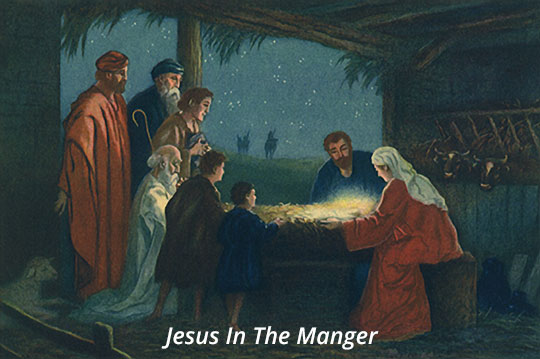
Jesus’ Parents
We saw in our last study that Joseph, who was thought to be His father, was a descendant of a royal line whose ancestor was King David. That was Joseph’s genealogy which is given in Matthew 1:1-17. The Holy Spirit has also given us another genealogy about Jesus the Christ and it is found in Luke 3:23-38.
While the passage tells us that people had assumed that Joseph was the father of Jesus, it is not true that Joseph’s father was Eli.
When He began His ministry, Jesus Himself was about thirty years of age, being, as was supposed, the son of Joseph, the son of Eli . . . Luke 3:23 (NASB)
If Eli is Joseph’s father, then why does Matthew 1:15 say that Jacob is Joseph’s father? A hint to the answer is found in a Jewish document called the Hieros Chagiagah 77.4. It states that Mary’s father was Heli. Since genealogies were very important to the Jews, this fact should not be ignored. If this is true, this means that the Holy Spirit is giving us Mary’s genealogy in this passage and therefore we should read the passage as follows,
. . . Jesus Himself was about thirty years of age, being (as was supposed the son of Joseph) the son of Eli . . . Luke 3:23 (NASB)
The Greek text supports this reading as we see later.
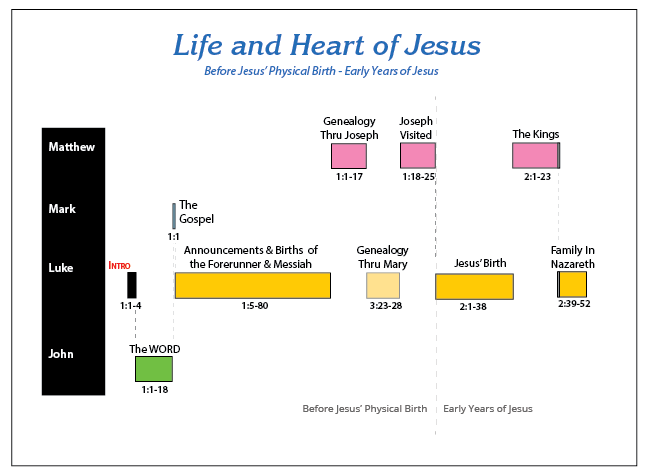
Genealogical Differences
If we compare the two genealogies, we discover some other amazing facts. The genealogy, as recorded by Luke, is longer than the one in Matthew by 16 names. The two genealogies diverge after King David. This means that the genealogies are either different or Luke’s genealogy is in error since Matthew’s genealogy agrees with the one found in 1 Chronicles 1-3. Since Luke says that he researched everything carefully and since 1 Chronicles was available to him; it is not likely that he would have made such a mistake. This suggests that the two genealogies are different from one another.
Luke’s genealogy is in the opposite order to the one in Matthew. That is, it starts with Jesus and goes all the way back to Adam and God. Luke wants us to know that Jesus was human in physical appearance. His first “father” was Adam. He was both God and human.
. . . of Matthat, of Levi, of Melchi, of Jannai, of Joseph, of Mattathias, of Amos, of Nahum, of Hesli, of Naggai, of Maath, of Mattathias, of Semein, of Josech, of Joda, of Joanan, of Rhesa, of Zerubbabel, of Shealtiel, of Neri, of Melchi, of Addi, of Cosam, of Elmadam, of Er, of Joshua, of Eliezer, of Jorim, of Matthat, of Levi, of Simeon, of Judah, of Joseph, of Jonam, of Eliakim, of Melea, of Menna, of Mattatha, of Nathan, of David, of Jesse, of Obed, of Boaz, of Salmon, of Nahshon, of Amminadab, the son of Admin, of Ram, of Hezron, of Perez, of Judah, of Jacob, of Isaac, of Abraham, of Terah, of Nahor, of Serug,of Reu, of Peleg, of Heber, of Shelah, of Cainan, of Arphaxad, of Shem, of Noah, of Lamech, of Methuselah, of Enoch, of Jared, of Mahalaleel, of Cainan, of Enosh, of Seth, of Adam, of God. Luke 3:24-38 (NASB)
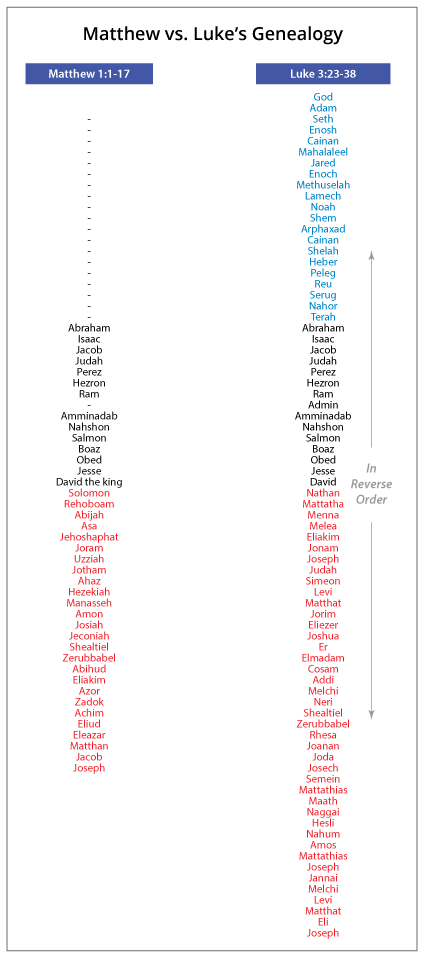
Since the Greek text does not include “son of” between each name, we have removed that repeating phrase in the passage. It helps us understand that Jesus was “of” Eli and Adam was “of” God. Jesus was not the actual son of Eli nor was Adam the actual son of God. Adam came from God only in the sense that God created him. Jesus was in the lineage of Eli and not his actual son.
Mary’s Genealogy
So whose genealogy is recorded in Luke? There are two major views. The first view comes from Julius Africanus, an early church father, who claims that the descendants of James (Jesus’ brother) had indicated that Jesus’ father was the child of a levirate marriage. This would mean that the wife of Eli did not bear him a male child; and upon his death, she married his brother Jacob and Joseph was born. Consequently, Eli would be the legal father, but Jacob would be the natural father. This means that Luke’s genealogy is the legal one of Joseph, and Matthew’s is the physical or actual genealogy. But this does not explain why the genealogies are different after King David. It also ignores the fact that Luke carefully avoided using the word “begat,” which occurs in Matt. 1:1-17, throughout the genealogy. But if Luke has recorded Mary’s genealogy, then “of” is correct according to Jewish custom.
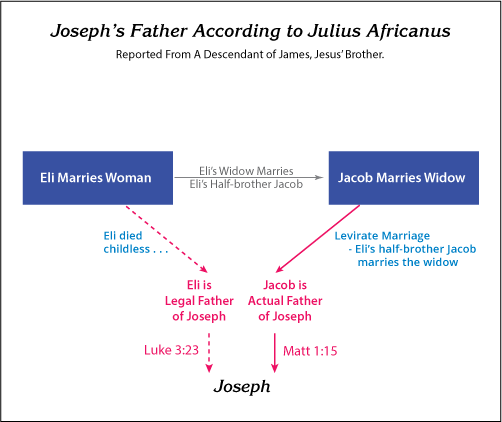
The second major view is that this is Mary’s genealogy. This appears to be the correct view since the Greek definite article is missing from Joseph’s name but is included with all of the other names. That is, the addition of Joseph’s name is unusual and suggests that the phrase “as was supposed, the son of Joseph,” should be treated as a parenthetical thought. That is, it is an explanation inserted in the genealogy. Mary’s name was skipped and her father was included since this is typical of Jewish genealogies. Therefore, Luke’s genealogy teaches that Joseph was not the father of Jesus. Jesus is a descendant of His grandfather. The gospel of Matthew contains Joseph’s genealogy and Luke contains Mary’s genealogy.
Parents And Children
Just as Joseph and Mary were selected to be Jesus’ parents, so God selected your parents for you. God’s design for the family is the union of a male and a female. The original family was Adam and Eve, not Adam and Adam or Eve and Eve. God designed families to bring new life into the world. His design includes grandmothers, grandfathers, and their parents and their ancestry. Genealogies should not be dull and boring! They represent family, love, kindness, life, and some day the saints of the ages will be together as one great family.
Jesus’ parents taught Him the sacred Scriptures and instructed Him in the things of the Lord. The statement “instructed Him in the Scriptures” is very meaningful when we realize that it was Jesus Himself who gave them the Scriptures. Moses had instructed the Israelites to teach their children about God when he said,
Hear, O Israel! The LORD is our God, the LORD is one! You shall love the LORD your God with all your heart and with all your soul and with all your might. These words, which I am commanding you today, shall be on your heart. You shall teach them diligently to your sons and shall talk of them when you sit in your house and when you walk by the way and when you lie down and when you rise up. Deuteronomy 6:4-7 (NASB)
God’s design is that parents teach their children the Scriptures and help them understand their Creator. Spiritual teaching is not the sole role of the Sunday School, the Christian School, the church leaders, or the pastor. The primary responsibility belongs to the parents. Notice that God says we are to teach spiritual truth at all times: sitting in our house, walking by the way, lying down, and getting up. We can only do that at home. If the children or the parents are not at home most of the time we have lost God’s vision for the family.
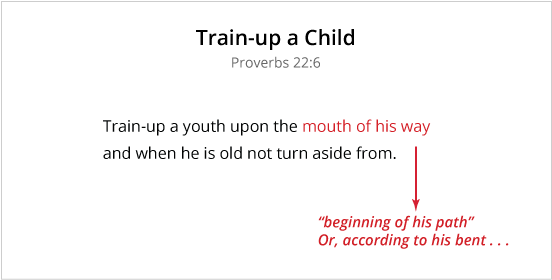
Parents are to train their children in scriptural things. Otherwise, they will become adults with sinful hearts and polished external behavior. Unfortunately, the inner person will eventually become visible. Our English Bibles do not translate Proverbs 22:6 correctly. The actual Hebrew text of the passage reads, “Train-up a youth upon the mouth of his way and when he is old not turn aside from.” It reads roughly because that is the flow of the Hebrew words. Notice the phrase “upon the mouth of his way” refers to the mouth which is the beginning of the digestive system. “The mouth of his way” refers to his/her bent. Everyone has a bent toward evil. Each one is unique. Therefore the Holy Spirit is saying that if parents do nothing to change their children’s original attitude toward selfishness, pride, arrogance, slander, sexual lust, anger, and hatred, for example, they will be like that as adults. That is, parents must not reinforce their child’s bent toward sin. They must train up a child from birth to correct his/her sinful bent.
We are all born as sinners.
Behold, I was brought forth in iniquity, and in sin my mother conceived me. Psalm 51:5 (NASB)
We are not born as good people. In Proverbs 13:24 God says that parents who withhold the “rod of discipline” – not the “rod of punishment” – actually hate their children. And Proverbs 23:14 warns that when physical discipline is not exercised, the soul of the young one is in danger.
Conclusion
It takes more than just a mother and father to raise a family. It takes godly grandfathers and grandmothers. Jesus had great godly parents. Yet he was born without sin because He was virgin born – without male sperm! Mary and Joseph trained him in righteousness and in the Scriptures even though He was a perfect child.
But Jesus’ brothers and sisters were born sinners, and the difference between them and Him must have been a shock to Mary and Joseph. Mom and Dad understood the difference between holiness and evil. They experienced it in the home. The Scriptures imply that Joseph and Mary faithfully trained their children in the Scriptures and taught them about God (Luke 2:39-52). They eventually believed in Jesus. The heart desire of godly parents is that their children will believe in Jesus some day. If you are a parent, is that your heart’s desire? That is the mark of a godly parent.
Suggested Links:
Joseph’s GenealogyWhy are the genealogical records for Jesus different in Matthew and Luke?
Genealogical Chart: Adam to Jesus